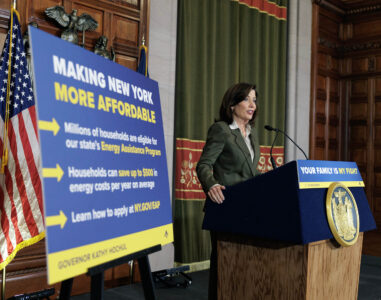Albany takes no action on packaging reduction and recycling bill
ALBANY — A bill that would have required manufacturers to sell products in New York in recyclable or compostable containers, and charged big manufacturers high fees for packaging waste, has gone another year without passing in the state Capitol.
The state Assembly left Albany this week without taking up the Packaging Reduction and Recycling Infrastructure Act — a closely watched environmental bill that would have established a statewide goal to reduce packaging waste by 30% over 12 years, establish a 75% recycling rate for all packaging by 2052, ban toxic chemicals and establish a packaging fee system that charges manufacturers for the goods they sell in unrecyclable packaging. It’s known as an “EPR” bill, for extended producer responsibility, and it shares similarities with other state EPR programs for electronics, batteries and prescription drugs.
The PRRIA was subject to significant lobbying efforts in the Capitol this year — groups like Beyond Plastics, run by former EPA regional administrator Judith Enck, and other environmentally-focused groups pitched it as a major step to shore up the recycling system and future-proof it, while lifting the burden of figuring out and funding new recycling infrastructure off of taxpayers and onto businesses.
But opponents like the Business Council and Upstate United warned against the legislation, which they said would set unworkable goals that would drive companies out of New York and the New York market. They also argued that putting extra costs on businesses would not save people significant amounts of money — they argued the costs of the new packaging fees would be reflected in the price of the products themselves.
“This bill will drive up costs for consumers, small businesses, and manufacturers throughout the state at a time when they’re already struggling with increased prices and supply chain pressures,” Upstate United warned in a statement shared just days before session ended.
Republicans and North Country lawmakers were also against the bill. Assemblyman Kenneth C. Blankenbush, R-Black River, has been a strong opponent of the PRRIA each time it has gotten significant attention in the statehouse. He said that the bill would be a death blow to food and other manufacturers in his district.
“Take a look at Kraft,” he said. “If this passes, they won’t be able to make the singles the way they do now, with the plastic separators. Working out a new way to do that would be majorly expensive, and I worry that companies like Kraft will just close up their New York factories, (and) stop selling to New York grocery stores, before they’ll take on such big costs just to serve one state.”
The bill had passed in the state Senate in May, and was awaiting action to come to the Assembly floor, which it got on Monday when the Assembly scheduled the bill for a committee and a floor vote. However, lawmakers were working to beat the clock on Tuesday, the last scheduled day of session for the Assembly, to pass as many bills as possible. Just before 12:30 a.m. Wednesday, Assembly Speaker Carl E. Heastie closed up session, dooming those bills that hadn’t made it to the floor yet.
A handful of other environmental bills similarly failed to pass this year, irking environmental advocates across the board. Lawmakers also failed to approve a moratorium on the use of bio-solids and sewage for fertilizer on any New York land, another bill that passed in the state Senate that didn’t move in the Assembly. That bill is an environmental response to years of encouragement from state and federal officials for local farmers to use the sludge, a mix of human and industrial waste from sewage treatment plants, as a cheaper fertilizer option. Environmental groups and academic organizations including at Cornell University have raised concerns that the substances are potentially toxic.
And neither chamber deigned to consider the “Better Bottle Bill,” a piece of legislation that would boost the bottle fee from 5 cents per bottle to 10, and up the redemption center reimbursement from 3.6 cents per item handled to 6 cents. Another major environmental bill, the New York HEAT Act, also died in the Assembly after an amended version of it passed in the Senate.
That prompted some scathing analysis of how the Assembly considers far fewer bills per year from the New York Public Interest Research Group, which advocates for environmental legislation in Albany.
On Wednesday, the NYPRIG put out a report analyzing how many bills have passed both in the Senate and Assembly in recent years — the average number of bills passed in both chambers of the legislature each year has dropped significantly, down nearly half from the years of Governor Nelson Rockefeller. In Rockefeller’s term from 1959 to 1973, the legislature passed 1,356 bills per year on average. In Governor Andrew M. Cuomo’s term from 2011 to 2021, only 671 were passed each year on average. In Governor Kathleen C. Hochul’s relatively short time in office since 2021, 891 bills have made it through each chamber on average per year.
Data shows that the Assembly, not the Senate, is the real holdup — the Assembly is much larger than the state Senate and has different rules regarding debate that mean most controversial bills take longer to pass in that chamber. Despite moves towards efficiency in recent years — the computerization of bill drafting, introduction of electronic and remote voting and faster communication methods, the Assembly has passed hundreds fewer bills per year than it did as recently as 2008. In 2008, the Assembly passed 1,641 bills in its six-month voting session, close to the Senate’s 1,764 bills. But this year, the Assembly passed only 995 bills to the Senate’s 1,743. Last year was similar, the Assembly passed 960 while the Senate passed 1,679.
The NYPRIG pointed out that numbers don’t denote productivity — many bills only rename roads or state properties, or make other relatively insignificant changes.
“It is up to New Yorkers to assess the legislature’s effectiveness and impact,” the statement reads.
“What the numbers make clear is that the Assembly, despite having more than twice as many members (150) compared to the Senate (63) approved far fewer bills and this year had a longer session (3 days), why it does so is not at all clear,” it continued.



